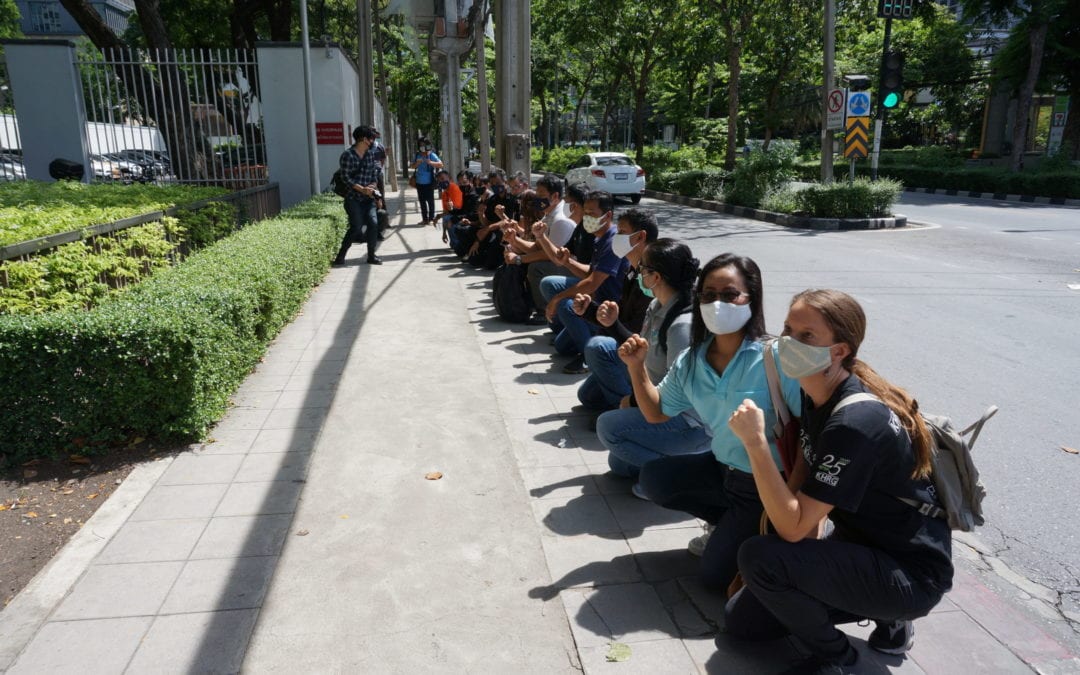Around the world, workers and their labor unions and have joined in solidarity with the Black Lives Matter protesters in the United States, demonstrating support for peaceful marches, and decrying racism, police brutality and inequality—in the United States and in their own countries.
In South Africa, the Congress of South African Trade Unions (COSATU) expressed outrage “at the extent to which racism is deeply entrenched and vicious in the U.S., particularly against blacks and other minority groups in a country purporting to be the world’s leading democracy.” COSATU also is one of the organizers of “Black Friday,” a campaign calling on South Africans to wear black every Friday to show solidarity in the fight against racism.
The South African Federation of Trade Unions wrote: “Saying ‘Black Lives Matter!’ is not just about opposing police brutality though. It is also about the structure of society: the political and economic systems that devalue black lives, black land, black culture and blackness.”
In a letter, the Nigerian Labor Congress condemned the murder of George Floyd and demanded justice for his killing, and demanded that world governments and institutions “take very strong and stern steps to stamp out racism in all its shades on the streets, in the workplace, and on play grounds.” And the Amalgamated Union of Kenya Metal Workers took to Twitter, calling George Floyd’s murder “unacceptable in this modern day.”
Meanwhile, the Confederation of Ethiopian Trade Unions said, “We recognize that anti-blackness is an injustice that must continue to be addressed fearlessly in the United States and around the world. We strongly believe that labor unions have a crucial role to play in this fight.”
In a letter of support, the Zimbabwe Congress of Trade Unions said, “Racism has no place in the modern-day world,” adding that it “supports the fight of the American people to dismantle racism and establish equality and social justice.”
Africans also marched in Ghana, Kenya, Liberia, Nigeria and Senegal.

Union activists support rally in support of Black Lives Matter in Thailand, Nigeria, Brazil and Tunisia.
Across Brazil, unions have organized rallies and panel discussions, and have sent letters in support of the U.S. protest movement. The CUT, which also participated in #BlackoutTuesday, said, “There have been centuries of oppression, inequalities and social injustices. Especially in this pandemic moment, the working class is the one who suffers the consequences both for the defense of lives as well as for the defense of jobs and rights, in addition to ensuring survival for many who can no longer guarantee their income in the informal economy.”
Brazil’s National Confederation of Workers in the Financial Sector (CONTRAF) repudiated all police violence against black people—especially in Brazil, where “75.4% of victims by Brazilian police were black” in 2019. And Brazil’s UGT, garment-sector federation CNTRV and the Center for Human Rights and Immigrant Citizenship conducted an online anti-racism campaign.
Tunisia’s UGTT called on all the unions around the globe to “build an international united front against racism and hatred, and to build social justice and equality in the USA and all over the world.”
On the other side of the world in Bangkok, about 50 Thai trade union leaders, staff and members gathered for the rally at the U.S. embassy to call on the U.S. government to stop police violence, racism and discrimination against black people. Garment unions in Bangladesh and Myanmar—in their own difficult fight for survival during the COVID-19 pandemic—posted photos of solidarity. To protesters in U.S. streets, the Bangladesh Sommolito Garment Sramik Federation tweeted, “What you are doing is necessary and vital to dismantle the oppression that saturates our world and deliver a future where justice prevails.”
All are Solidarity Center partners.
See the Solidarity Center’s statement on Black Lives Matter and the fight for social justice here.

